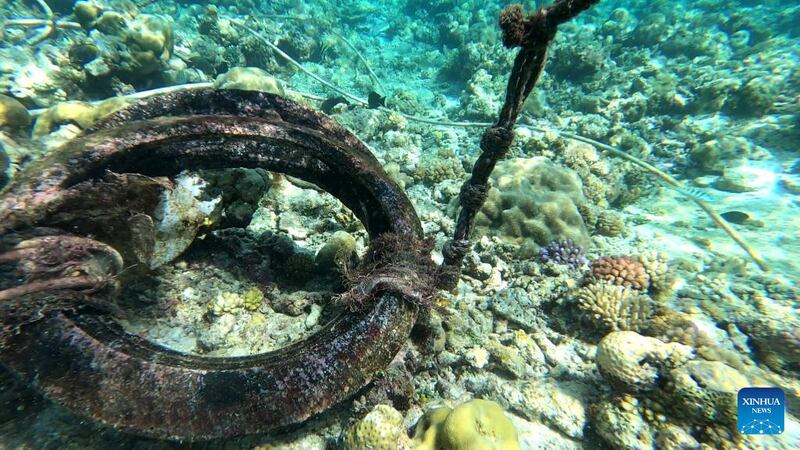The Philippines on Tuesday rejected criticism by China that the military vessel it grounded on a disputed reef in the South China Sea had damaged its coral ecosystem.
The National Task Force for the West Philippine Sea – Manila’s name for the part of the South China Sea within its exclusive economic zone – said in a statement that the accusation against the Philippines “is false and a classic misdirection.”
“It is China who has been found to have caused irreparable damage to corals,” it said, “It is China that … jeopardized the natural habitat and the livelihood of thousands of Filipino fisherfolk.”
In 1999, Manila deliberately ran an old warship aground – the BRP Sierra Madre – to serve as a military outpost on Second Thomas Shoal, which it refers to as Ayungin. Confrontations there between the Philippine and Chinese coast guards have intensified in recent months.
On Monday, China released a survey report on the supposed damage caused by the Philippines to the reef at the Second Thomas Shoal, which China calls Ren'ai Jiao, and is claimed by both countries.
The report commissioned by China’s Ministry of Natural Resources said that the “illegally grounded” BRP Sierra Madre has gravely damaged “the diversity, stability and sustainability of the coral reef ecosystem”.
It added that Chinese scientists conducted a survey through satellite remote sensing and field investigation in April and found that not only had the ship grounding process inflicted “fatal damage” on the coral reef, but its prolonged grounding also “has greatly inhibited the growth and recovery of corals in the surrounding area.”

China said photos released with the report showed dead corals underneath the Philippine warship, with researchers calculating that the aggregate coverage of reef-building corals at the reef has declined by 38.2%.
The report proposed that the Philippines promptly remove its ship from the shoal, “thereby eliminating the source of pollution, and preventing further sustained and cumulative damage to the coral reef ecosystem.”
China claims most of the South China Sea and all the islands and reefs within the so-called nine-dash line that it draws on maps to mark “historic rights” to the waters.
An international arbitral tribunal in 2016 ruled against all of China’s claims but it refuses to accept it.
'Fake news and disinformation'
The Philippine task force called China’s survey report an attempt to “spread fake news and disinformation,” as well as to conduct “malign influence operations” against the Philippines.
It cited the 2016 arbitral award, which found that Chinese authorities were aware that their fishermen were harvesting endangered species on a substantial scale in the South China Sea using methods that inflicted severe damage on the coral reef environment. Additionally, they had not fulfilled their obligations to stop such activities, the task force said.
The Philippines has collated evidence that China has been responsible for severe damage to corals at a number of reefs in the disputed waters, it said, calling for an independent, third-party marine scientific assessment by impartial recognized experts.
It also invited neighboring countries to join the Philippines in “pushing for a more united, coordinated, and sustained multilateral action to protect and preserve the marine and land biodiversity in our region.”
RELATED STORIES
[ South China Sea coral reefs under severe threat: reportOpens in new window ]
[ Vietnam rapidly builds up South China Sea reefOpens in new window ]
[ Overfishing fuels South China Sea tensions, risks armed conflict, researcher saysOpens in new window ]
The Asia Maritime Transparency Initiative, or AMTI, at the U.S. Center for Strategic and International Studies, said in a report last December that China had caused the most reef destruction through dredging and landfill while developing artificial islands in the South China Sea.
More than 6,200 acres (25 square km) of coral reef have been destroyed by island building efforts in the South China Sea, with 75% of the damage – equivalent to roughly 4,648 acres (19km2) – being done by China, according to AMTI.
Another 16,353 acres (66 square km) of coral reef were damaged due to giant clam harvesting operations by Chinese fishermen, it said.
China dismissed the AMTI report as “false” and said it was based on old satellite images.
Chinese officials maintain that China continues to give importance to protecting the environment in the South China Sea.
Jason Gutierrez in Manila contributed to this report.
Edited by Mike Firn and Taejun Kang.
